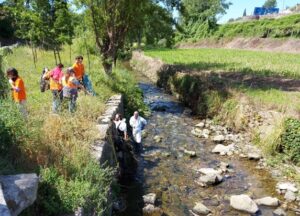With a contribution by both the Vocational School of Campanhã (Portugal) and Vizyon Koleji Bahçeşehir Kampüsü (Turkey), the students got together to discover how their cities proposed and imposed methods for sustainability and how they would work.
The city of Porto has been aiming for some time to be among the most sustainable cities in the European Union, showing a period of remarkable economic development, guaranteeing the protection of the environment and the regeneration of ecosystems. Encouraging the sustainability inside our city does not only make it a cleaner place to live but also makes it a more attractive place to visit. Waste collection, the selective collection of bio waste and its separation and recycling in the City of Porto is a huge task for sustainability, as this represents about 37% of the urban waste produced.
Istanbul is the biggest pioneer in this regard as part of the zero waste project, the Istanbul municipality aims to increase the recycling rate from 13% in 2019 to 35% by the end of 2023 and to catch up with the 46% recycling rate of the European Union. In the municipality of Zeytinburnu (İstanbul), the “Waste recovery project” was launched to create Zero Waste Recovery Project” was launched to create Zero waste Neighborhoods with the aim of reintroducing local recyclable materials to the economy. The waste control aims to fulfill sustainable development goals, especially number 11- Sustainable Cities and Communities. It aims to secure a clean and livable world for future generations.

Image 1 – Turkish artist Deniz Sagdic, created this piece of art with waste collected from Istanbul Airport
In Turkey and Portugal, strategies were created to promote the cities sustainability, all with the intention of achieving carbon neutrality by 2030.
- The city of Porto has invested a lot in treatment. New ecopoints were installed and there was an increase in the number of vehicles for waste collection.
- Istanbul Grand Airport (İGA), the airport’s operator, has carefully implemented a range of environment and sustainability policies- has become the first airport in Turkey to be issued with a Zero Waste Certificate.
 Image 2 – Students from the Vocational School of Campanhã doing waste collection on the beach.
Image 2 – Students from the Vocational School of Campanhã doing waste collection on the beach.
One of the key projects for our cities sustainability is the Zero Waste Project, which aims to reduce waste generation and increase recycling rates in Istanbul and Porto. The project includes the establishment of new recycling facilities, the promotion of recycling among citizens and students, and the implementation of waste separation at the source. There are several ongoing sewage water projects in Istanbul, Turkey. One of the most significant projects is the Istanbul Water and Sewerage Administration (ISKI) Water Supply and Sewerage Improvement Project, which aims to improve the water supply and wastewater infrastructure in Istanbul.

Image 3 – Students from Vocational School of Campanhã cleaning a local river.
Another important project is the Istanbul Strait Crossing Sewerage Project, which aims to build a tunnel under the Bosphorus Strait to transport wastewater from the Asian side of Istanbul to the European side, where it will be treated at a newly constructed treatment plant. These projects are critical to improving the overall water quality in Istanbul and protecting the health of the population and the environment. The Turkish government, local authorities, and international organizations are all involved in the financing and implementation of these projects, which are expected to be completed in the coming years.


Collaborative work between students from Escola Profissional de Campanhã (Portugal) and Vizyon Koleji Bahçeşehir Kampüsü (Turkey)




You must be logged in to post a comment.